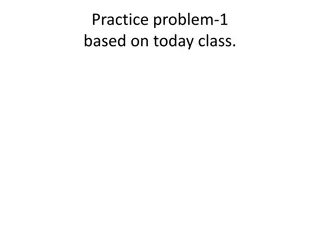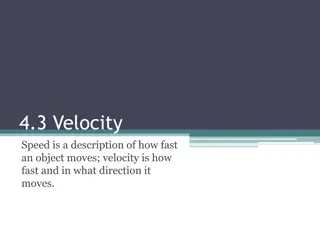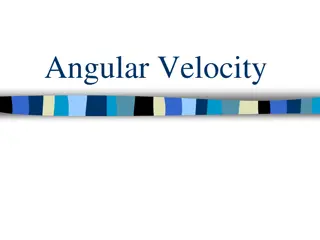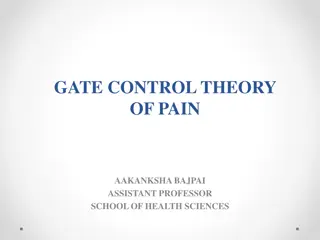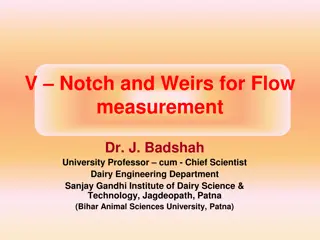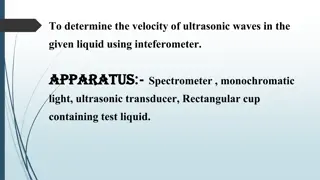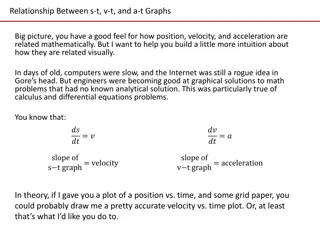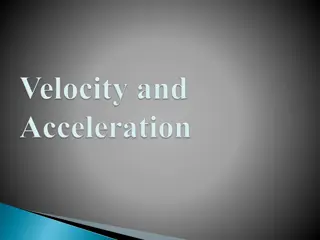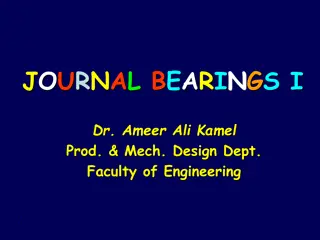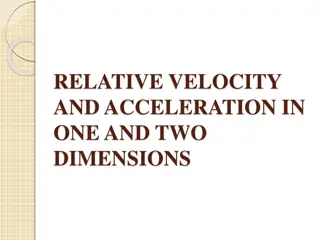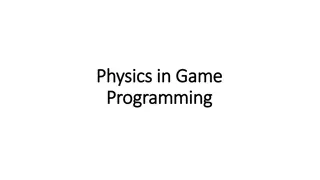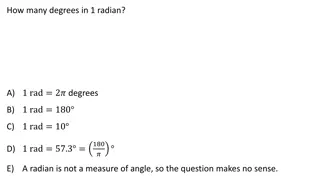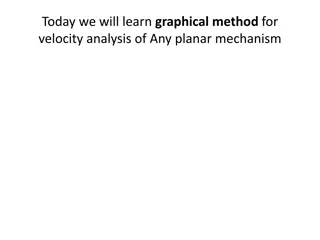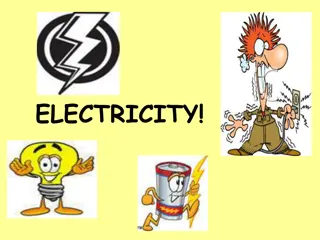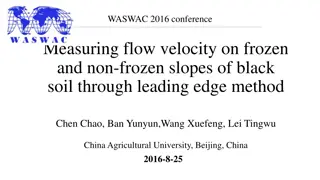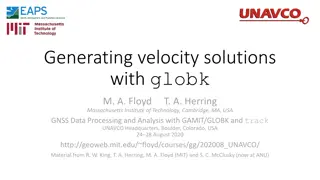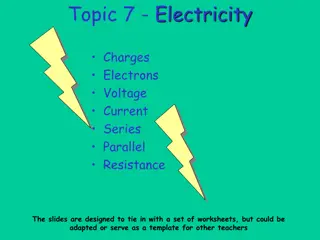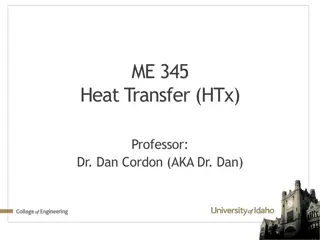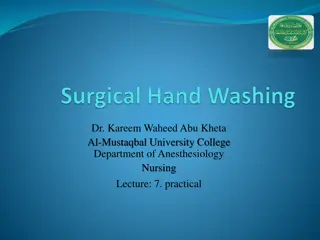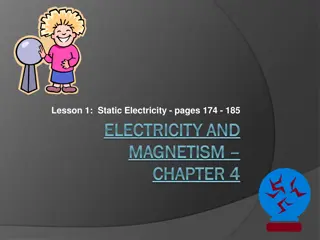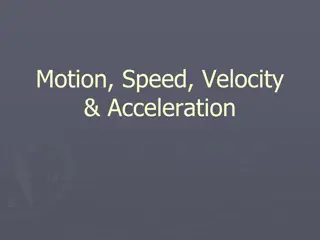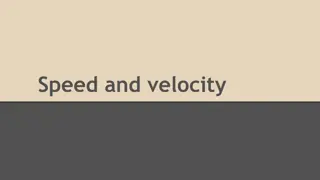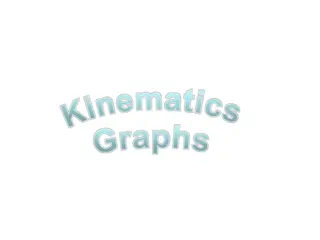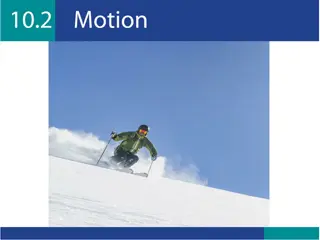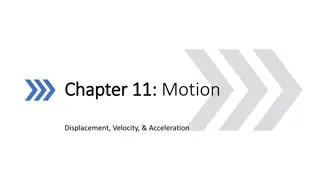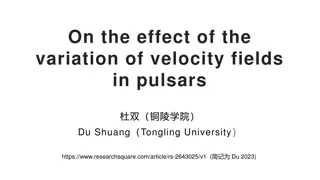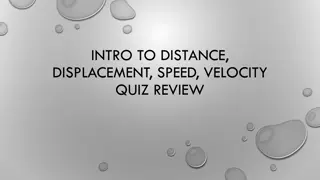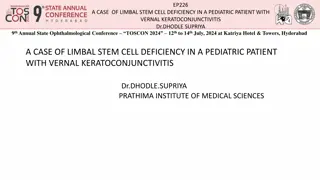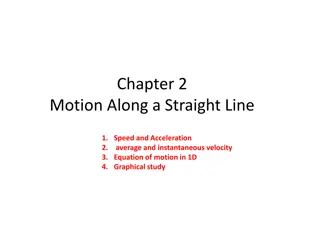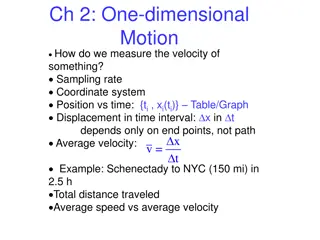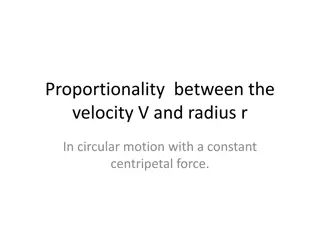Understanding Slider Crank Mechanism: Practice Problems and Solutions
Explore a practice problem based on a slider crank mechanism, involving calculations for velocity of the slider, velocity of a point on the connecting rod, and angular velocity. Detailed steps and solutions provided to understand the concepts clearly.
1 views • 6 slides
Understanding Acceleration in Physics
Acceleration is the rate at which velocity changes, encompassing both increases and decreases in speed. In physics, acceleration is defined as the rate of change in velocity, making it a vector quantity due to its directional nature. This article explores the concept of acceleration, including examp
0 views • 15 slides
Understanding Velocity vs. Speed in Physics
Velocity and speed are fundamental concepts in physics that describe how fast an object is moving and in what direction. While speed is a scalar quantity representing the rate of motion, velocity is a vector quantity that includes both speed and direction. Constant velocity implies steady speed and
0 views • 8 slides
Understanding Rotational Motion: Angular Velocity and Acceleration
Explore the concepts of angular velocity, radians, and rotational motion in this educational content. Learn about the relationship between angular and linear velocity, angular acceleration, tangential acceleration, and centripetal acceleration through practical examples. Enhance your understanding o
4 views • 17 slides
Understanding the Gate Control Theory of Pain in Pain Management
This detailed content delves into the Gate Control Theory of Pain, explaining pain pathways involving nociceptors, A-delta fibers, and C fibers. It further explores central pain pathways like the spinothalamic tract, spinomesencephalic tract, and spinoreticular tract. The theory's mechanism of pain
3 views • 11 slides
Flow Measurement Using V-Notch and Weirs in Engineering
Flow measurement in engineering involves the use of V-notch and weirs, such as rectangular weirs and triangular weirs, to calculate discharge rates and velocity of liquids. A V-notch is a triangular obstruction used for flow measurement, while weirs are larger scale structures for measuring river or
1 views • 7 slides
Determining Ultrasonic Wave Velocity in Liquid Using Interferometer
An ultrasonic interferometer apparatus is used to determine the velocity of ultrasonic waves in a liquid medium by creating longitudinal stationary waves and utilizing the principles of diffraction. The experiment involves passing monochromatic light through the liquid, creating an acoustic grating,
0 views • 16 slides
Understanding White Liniment: Composition and Preparation
White liniment is an emulsion-type liniment that includes ingredients like turpentine oil, oleic acid, and ammonium chloride. This type of liniment is intended for external application to the skin with rubbing. The procedure involves mixing the ingredients to create a water-in-oil emulsion. Understa
0 views • 6 slides
Understanding the Relationship Between Position, Velocity, and Acceleration Graphs
Gain intuition on how position, velocity, and acceleration are visually related through s-t, v-t, and a-t graphs. Discover how to interpret and draw accurate velocity vs. time plots based on position vs. time data. Learn the significance of comparing these charts and how they can be useful in variou
0 views • 20 slides
Understanding Velocity: The Key to Motion
Velocity is the speed and direction at which an object moves, indicating both its position and rapidity. It is crucial for measuring the rate of change of an object's position over time and differentiates from speed as a vector quantity. This comprehensive guide delves into the concepts of velocity,
2 views • 33 slides
Understanding Journal Bearings in Mechanical Design
Journal bearings play a crucial role in mechanical design by utilizing lubrication to minimize friction and wear between rubbing surfaces. This article explores the concept of lubrication, the wedge effect in journal bearings, methods to create a viscous layer, and the parameters affecting generated
5 views • 40 slides
Understanding Relative Velocity and Acceleration in Physics
Relative velocity is defined as the velocity of an object in the rest frame of another object, and it can be negative depending on the difference in velocities. The need for using relative velocity lies in determining if an object is at rest or moving. The formula for relative velocity involves the
1 views • 25 slides
Understanding Vectors and Velocity in Physics and Game Programming
Exploring the concepts of vectors, velocity, and positional vectors in both physics and game programming. Learn about key properties, conversion formulas, and the application of velocity vectors to positional vectors using examples and visual representations.
1 views • 32 slides
Understanding Liniments: Alcoholic and Oleaginous Solutions for External Application
Liniments are topical solutions intended for external application to the skin through rubbing. They can be alcoholic or oleaginous, with the choice of vehicle depending on the desired action and solubility of components. Emulsions require thorough shaking before use, and the solvent for oleaginous l
4 views • 5 slides
Physics Concepts: Angular Velocity, Radians, and Acceleration Explained
Understand essential physics concepts such as angular velocity in radians, comparison of angular velocities, tangential velocity, magnitudes of velocities, and angular acceleration as applied to various scenarios like rotating wheels, clock hands, and spinning objects. Dive into the relationships be
1 views • 31 slides
Understanding Relative Velocity of Bodies in Motion
The content explains concepts related to relative velocity of moving bodies, including diagrams illustrating velocity relationships, application of laws of parallelogram and triangle, analysis of motion in rigid links, and calculation of rubbing velocity at pin joints in mechanisms. It covers scenar
0 views • 23 slides
Graphical Method for Velocity Analysis of Planar Mechanisms
Learn about the graphical method for velocity analysis of planar mechanisms through practice problems involving slider-crank mechanisms and link velocities. Understand how to calculate slider velocity, point velocity, and angular velocities using the given dimensions and rotational speeds. Visualize
0 views • 6 slides
The Wonders of Electricity: From Appliances to Static Energy
Explore the fascinating world of electricity through everyday activities like making toast and doing laundry, and learn about static electricity and how it can make hair stick to balloons and sweaters. Remember to plug things in for power and discover the magic of static electricity generated by rub
0 views • 5 slides
Measurement of Flow Velocity on Frozen and Non-Frozen Slopes of Black Soil Using Leading Edge Method
This study presented a detailed methodology for measuring flow velocity on frozen and non-frozen slopes of black soil, focusing on the Leading Edge method. The significance of shallow water flow velocity in soil erosion processes was emphasized. Various methods for measuring flow velocity were compa
0 views • 23 slides
Strategies for Generating Velocity Solutions with GLOBK
Basics of velocity solutions, setup strategies, and data cleaning methods for optimizing GLOBK solutions to generate position, velocity, offset, and postseismic parameter estimates. The aim is to combine years of data, make critical decisions on data treatment, and ensure accuracy in the process noi
0 views • 22 slides
Understanding Electricity and Charges: A Teaching Resource
Explore the fascinating world of electricity, charges, electrons, voltage, current, series, parallel circuits, and resistance through engaging slides designed to complement worksheets. Discover hands-on experiments that illustrate concepts like rubbing plastic to create static charges, observing eff
0 views • 47 slides
Understanding Internal Flow in Heat Transfer Processes
Exploring internal flow characteristics in heat transfer, we delve into topics like laminar flow, velocity profiles, Reynolds number, and entry lengths for different flow regimes. Images illustrate concepts such as fully developed velocity profiles and the impact of flow conditions on the mean veloc
0 views • 27 slides
Understanding Acceleration in Physics
Explore the concept of acceleration through real-world scenarios involving moving objects and graphs. Learn how to determine the direction of acceleration based on the velocity changes of cars, divers, bungee jumpers, and more. Delve into examples of calculating average acceleration and final veloci
0 views • 11 slides
Proper Hand Washing Techniques in Anesthesiology Nursing
Dr. Kareem Waheed Abu Kheta from Al-Mustaqbal University College emphasizes the importance of proper hand washing in anesthesiology nursing to reduce the risk of transmitting infectious organisms. The lecture covers the reasons for hand washing, necessary equipment, and step-by-step instructions for
0 views • 16 slides
Understanding Static Electricity: Two Kinds of Charges
Explore the concept of static electricity and the two types of charges - positive and negative - present in matter. Learn how charges can be separated through rubbing or pulling objects, leading to the buildup of static electricity. Unravel the properties of particles in matter and the significance
0 views • 16 slides
Understanding Chromatography: A Practical Experiment
Chromatography is a process used to separate components of a mixture by employing a mobile phase that carries the mixture through a stationary phase. This experiment by Mariam Nimri explores the effects of different solvents on chromatography results, with a hypothesis that vinegar can impact pigmen
1 views • 10 slides
Understanding Motion: Speed, Velocity, and Acceleration
Motion is the change in position of an object relative to a reference point. Speed is the distance traveled divided by the time interval, while velocity includes direction. Acceleration refers to the rate of change of velocity. Different concepts and scenarios related to motion, speed, velocity, and
0 views • 16 slides
Understanding Speed and Velocity in Physics
Speed and velocity are fundamental concepts in physics. Speed is a scalar quantity that can be average or instantaneous, while velocity is a vector quantity that includes direction. Equations such as v=d/t help calculate these values. Average speed and average velocity are important in determining t
1 views • 10 slides
Understanding Kinematics Graphs in Physics
Explore the concepts of kinematics graphs through diagrams and descriptions. Learn to interpret distance-time, velocity-time, and speed-time graphs. Understand key parameters such as displacement, initial velocity, final velocity, constant acceleration, and time spent on different parts of a journey
0 views • 33 slides
Understanding Motion in Physics
Explore the concepts of speed, velocity, and acceleration in physics, learn how to interpret distance-time and velocity-time graphs, and practice calculating the speed and acceleration of objects. Engage in experiments to calculate average speeds and write reports detailing procedures, variables, da
0 views • 77 slides
Understanding Motion: Displacement, Velocity, and Acceleration
Explore the fundamental concepts of motion, including displacement, velocity, and acceleration. Learn about reference points, distance versus displacement, speed versus velocity, and how to calculate average speed and acceleration. Dive into examples illustrating these concepts in real-world scenari
0 views • 24 slides
Analyzing Firing Velocity of N-Strike Elite Nerf Gun by Haley Vermette
Haley Vermette conducted a project to test the claim made by Hasbro about the N-Strike Elite Nerf Gun's shooting range. Through critical thinking, problem-solving, and testing, various variables like time, distance, muzzle height, and firing velocity were analyzed to support or disprove the claim on
0 views • 15 slides
Impact of Velocity Field Variations on Pulsar Magnetic Fields
The study explores how variations in velocity fields affect pulsar magnetic fields, highlighting the conversion of kinetic energy to magnetic energy in pulsars. Glitches in these systems can lead to changes in magnetic fields, influencing pulsar emissions. The maintenance of stable magnetic fields a
0 views • 14 slides
Motion and Velocity Concepts Illustrated Quiz Review
Explore concepts of distance, speed, displacement, and velocity through examples of a moving truck's position, Julie's journey to meet her friends, and calculations of velocity for trips from Pittsburgh to Philadelphia and Hong Kong to Los Angeles. Understand the differences between speed and veloci
0 views • 8 slides
Case Study: Limbal Stem Cell Deficiency in Pediatric Patient with Vernal Keratoconjunctivitis
Limbal stem cell deficiency (LSCD) is a rare condition characterized by inadequate corneal rejuvenation and conjunctivalization of the cornea. In this case study, a 14-year-old male with Vernal Keratoconjunctivitis presented with itching, eye rubbing, and corneal epithelial scarring resembling a who
0 views • 6 slides
Understanding Motion Along a Straight Line
Exploring the concepts of speed, acceleration, velocity, displacement, and distance in one-dimensional motion. Topics include average and instantaneous velocity, equation of motion, graphical analysis, position measurement, and the differences between distance and displacement. Dive into average spe
0 views • 47 slides
Proper Handwashing Guidelines in Clinical Settings
CDC emphasizes the importance of hand hygiene in preventing the spread of pathogens. Proper handwashing involves using soap and warm water, rubbing hands vigorously for at least 20 seconds, rinsing well, and drying with a single-use towel. It is recommended to wash hands after specific activities to
0 views • 22 slides
Understanding One-Dimensional Motion and Velocity Measurements
Exploring the concept of velocity measurement in one-dimensional motion, this content delves into the sampling rate, coordinate systems, and the relationship between position and time. It discusses average velocity, instantaneous velocity, and the significance of slope on graphs representing motion.
0 views • 22 slides
Understanding Orbital Motion and Circular Velocity in Physics
Explore the concept of orbital motion and circular velocity in physics, where we delve into the relationship between velocity and radius in circular motion with a constant centripetal force. Through Newton's 2nd Law and gravitational forces, we uncover the dependence of satellite speed on the radius
0 views • 13 slides
When to Get Your Child's Eyes Examined for Optimal Health
Ensuring good vision in children is crucial for their overall development. Early detection through a comprehensive eye exam at 6-9 months can help identify potential issues like amblyopia and strabismus. Regular check-ups between ages 3-5 and before starting Kindergarten are recommended to monitor v
3 views • 6 slides
